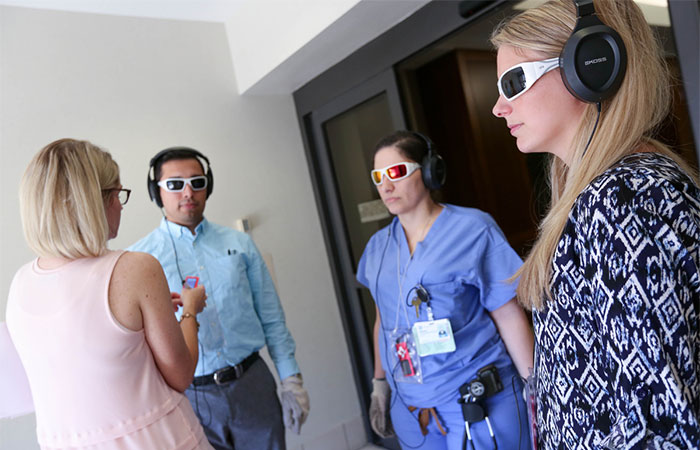A virtual tour of dementia
By Jan Jarvis
After struggling to take her morning pill, Dr. Gillian Greer collapsed on the couch and sighed.
“I feel like I can’t focus on anything,” she said. “I can’t remember what I am supposed to be doing.”
For Greer, a physician and resident with JPS Health Network, experiencing what life is like for individuals with dementia offered insight into what many of her elderly patients face on a daily basis.
As a participant in the Second Wind Dreams Virtual Dementia Tour, Dr. Greer got a perspective on aging that physicians rarely do. UNT Health Science Center has partnered with James L. West Alzheimer’s Center in Fort Worth to give family medicine residents from JPS and Plaza Medical Center a new perspective on aging.
The tour is part of UNT Health Science Center’s Workforce Enhancement in Healthy Aging and Independent Living or WE HAIL, a program developed to transform geriatric care in North Texas by improving training for health professionals and caregivers. The simulation is one of five WE HAIL projects funded by a $2.55 million grant from the Health Resources & Services Administration.
Being placed in a challenging situation with a lot of distractions means residents experience what their patients deal with, said Subhada Prasad, WE HAIL Program Coordinator in the Center of Geriatrics at UNT Health Science Center.
During the dementia experience, trained facilitators guide participants outfitted with devices that alter their senses while they try to complete common everyday tasks and exercises. The devices – including specialized gloves, goggles and headphones – are designed to mimic loss of dexterity, and conditions such as neuropathy, blurred vision and hearing impairment.
The tour enables caregivers to experience the physical and mental challenges those with dementia face – and use the experience to provide better care.
“This experience gives you real insight into what it is like to be an elderly patient,” said Dr. Katie Kestler, a family medicine resident at JPS. “This is really difficult and challenges your senses.”
Participants experience sensory overload and easily become very frustrated, said Jaime Cobb, Director of Community Relations at James L. West Alzheimer’s Center.
“The tour is designed to mimic someone in the moderate stages of dementia,” she said. “They may be able to follow two-step commands but remembering all five tasks is challenging.”
When the tour ends, the residents discuss how to tour affected them and ways they can use the experience to better serve their patients. The conversations reinforce the importance of focusing on the patient’s quality of life and not just worrying about their lab numbers.
Dr. Michael Casstillo, a family medicine resident, said he already tries to focus on each patient’s needs, but the tour drove home the need to pay extra attention to the challenges older people face.
“When you can’t see, even the simplest tasks become really frustrating,” he said.







Social media